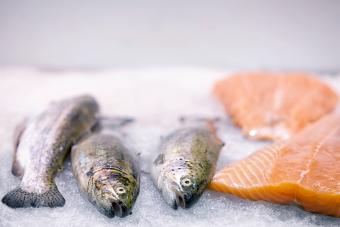
Yes, dogs can eat fish. However, there are certain types of fish that are recommended over others, and you should avoid feeding fish prepared with excessive amounts of butter, salt, spices, onions and garlic, and any ingredients known to be harmful to dogs.

Fish is Beneficial to Your Dog's Health
Fish smells good to dogs, and there's a reason for that. Fish is a good source of protein and is frequently included as an alternate protein source in dog food. Fish is also a great option for dogs that are allergic to commonly used proteins, such as chicken.
The following are benefits associated with feeding fish to your dog:
- Omega-3: Fish is high in omega-3 fatty acids, which may offer health benefits such as reducing inflammation.
- Vitamin A: Fish is a rich source of vitamin A, which can help your dog see better in dim light and slow down age-related vision loss. Vitamin A, also known as retinol, is abundant in cod and salmon, which are two of the most popular fish on the market.
- Immune Health: Fish is abundant in iron, zinc, and selenium, all of which help to keep your immune system in good shape. Iron is necessary for the development of red blood cells, and a shortage of it might make your dog weak and fatigued. Zinc is an antioxidant that aids in the formation of new cells and enzymes, as well as the normal functioning of the thyroid and digestive systems.
Take Caution when Choosing and Feeding Fish
The bones of fish are tiny, fragile, and possibly fatal if they cause an obstruction in your dog's airway. They can get into your dog's mouth, esophagus, stomach, and intestines, perforating the organ wall in some cases. This is not only uncomfortable, but it can also result in a costly visit to the veterinarian. If you are feeding a larger fish, it's important to ensure there aren't any bones in the flesh.
Recommended Fish Types for Dogs
You should look for wild-caught, small, fatty, oily fish. It's recommended to stay away from farmed and predatory fish. Many predatory fish have longer life spans and can accumulate mercury and other heavy metals in their systems, resulting in heavy metal toxicity. Farmed fish are frequently given hormones and drugs to prevent disease, which is also a drawback if you're looking to feed fish for its beneficial properties. If feeding fresh fish (wild caught or not), it's also a good idea to freeze them for at least a week before eating them to destroy any bacteria or parasites that may be present.

Recommended fish include:
- Sardines: Can be canned as long as they are in fresh water with no salt added, and not oil or tomato juice (be sure to check sodium levels on the packaging)
- Salmon
- Smelt
- Anchovies
- Cod
Fish to avoid include:
- Tuna
- Tilapia
- Walleye
Amount of Fish to Include in the Diet
Fish can be supplied as a special treat or dietary supplement several times a week, depending on your dog's nutritional needs and overall health.
If you're considering a raw or home-based diet for your dog, you may include appropriate fish on a daily basis.
Based on your dog's age, weight, and medical needs, as well as the suggested diet type, your veterinarian or canine nutritionist will advise you on the amount of fish to include in their diet.
Consult Your Veterinarian with Any Questions
Long story short, dogs can eat fish, and fish can be a healthy part of your dog's diet if it does not contain any added oils or spices, does not contain any bones, and is not a species prone to high mercury levels, such as tuna. Contact your veterinarian or canine nutritionist for more information on dog nutrition or feeding fish to your dog.







